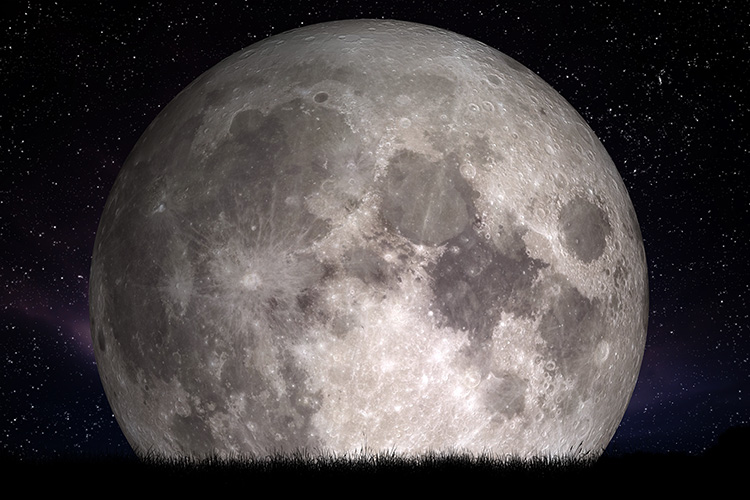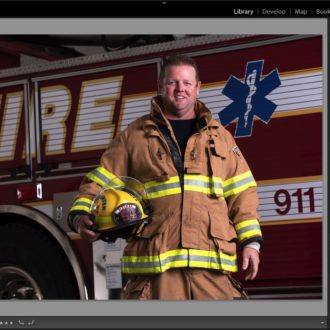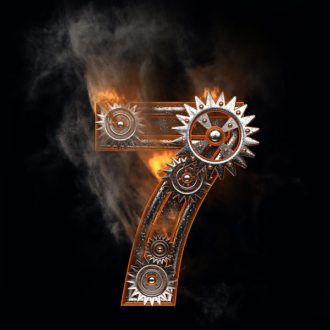How to Shoot The Super Moon Tonight!

Howdy everybody, and greetings from Denver (I’m here for my seminar today). Caught a late flight after the Bucs vs. Bears game last night — look forward to meeting everybody here today. 🙂
OK, tonight’s the big Super Moon shoot (well, it started last night, and wraps up tonight), so since everybody here is a photographer, I thought I’d toss in a quick tutorial on how to get a good shot of this celestial phenomenon, and the settings I’d use to get there.
STEP ONE: Use a tripod. Technically, you could do this hand-held because of the shutter speed we’re going to use, but you want it to be really sharp, so I highly recommend a tripod.
STEP TWO: Use the longest lens you have. If you have a tele-extender, slap that on, too! Even those it’s probably the closest to earth it’s ever going to be during our lifetime, it’s still a ways away, so if you’ve got a 300mm, a 400mm, etc., now’s the time to pull that bad boy out.
STEP THREE: Shoot in Manual Mode; set your ISO to 100 (or whatever your cleanest, native ISO is). Then set your f/stop to f/11, and set your shutter speed to 1/250 of a second (this isn’t a long exposure situation — the moon is moving, and it’s bright, so you need a nice quick shutter speed, even though it seems like you wouldn’t).
STEP FOUR: Because what you’re trying to do here is show the sheer size of the super moon, I would put something in the shot to show a sense of scale (like the grass you see in the shot above). Shoot it with a cityscape in the background — a building — a tower, a hill, a large oak tree; a coyote howling at the moon; ET flying in front of it, etc. Otherwise, it will just be a moon photo like any other moon photo, so giving it a sense of scale makes all the difference with a super moon.
STEP FIVE: The final step is focusing. You can use the Auto Focus on your camera (especially tonight), but if you have a lens that has a focus scale, you can set your lens to focus to infinity by doing this: switch your lens to Manual focus; turn your focus barrel all the way until you see the infinity symbol in the little window on your lens, then once you reach infinity, turn back to the line just before the Infinity symbol. If your lens doesn’t have this feature, again, you can use Auto Focus, or even just manually focus on the moon — it’s pretty big and bright.
OK, that’s the ticket — wishing you a super, super moon shot!
Best,
-Scott
P.S. Over on my blog today I revealed the winner (and some honorable mentions) of my Worldwide Photo Walk’s new Video Category competition. Here’s the link if you’ve got a sec.



First off I would like to say awesome blog! I had a quick question which I’d like to ask if
you don’t mind. I was interested to find out how you
center yourself and clear your head prior to writing.
I have had a hard time clearing my thoughts in getting my ideas out there.
I do enjoy writing but it just seems like the first 10 to 15 minutes are generally lost just
trying to figure out how to begin. Any ideas or hints?
Appreciate it!
Amazing shoot indeed!
I used a Nikon Coolpix P900 – which has a MOON-Scene-Default. Simple to use not only with a SUPER-Moon
Great shot!!!!
Well, I loved your 4th point the most and learned something new. All points are worth noting/bookmarking as these are explained very well. Thanks a lot!!
[…] post How to Shoot The Super Moon Tonight! appeared firs… Lightroom Killer […]
One thing I did wrong yesterday: if oben tries to capture the moon and a city for scale, pease make sure that there is some space between the moon and the city: you will need two shots as the moon is super bright. And putting the shots together in post is a nightmare if the bright moon floods all nearby buildings
thanks God Bless
Should we use a remote shutter control?
The buildt-in self timer would be sufficient. (2 or 10 seconds delay from shutter press). I use it all the time in situations like this. 🙂
don’t forget to put the self-timer OFF after shooting… happened me more then once, that after the shoot, days later, I tried to shoot, and nothing happened…. until, after 2 seconds ‘click’ 😛
Don’t forget to turn IS/VC/Whatever (Stabilizer) OFF when you use a Tripod! Some cameras don’t do that automatically.
Thanks, Stefan!
Why? It’s not better?
okay that’s where i went completely wrong. since it’s a night shot i thought the slower (shutter) the better lol. thanks for the tip.
Nope… one would think that but the moon is a moving target. Slow but it’s moving every second. You have to have the mindset of a sports shot. What’s the fastest speed you can take it. I even disagree with f11. That’s asking for a slower shutter speed. You can push the shutter speed faster with f8. Spot metering also helps.
You won’t really need to meter the moon, it is one subject that you can be pretty sure is going to hit Sunny 16. Metering will be difficult, you will need to have a long enough lens that the moon fully fills the spotmetering area; Oh and if you can fill the metering area don’t forget that you will probably need to have between +1 and +2 stop EV. So I usually just use the Sunny 16.
[…] post How to Shoot The Super Moon Tonight! appeared first on Lightroom Killer […]